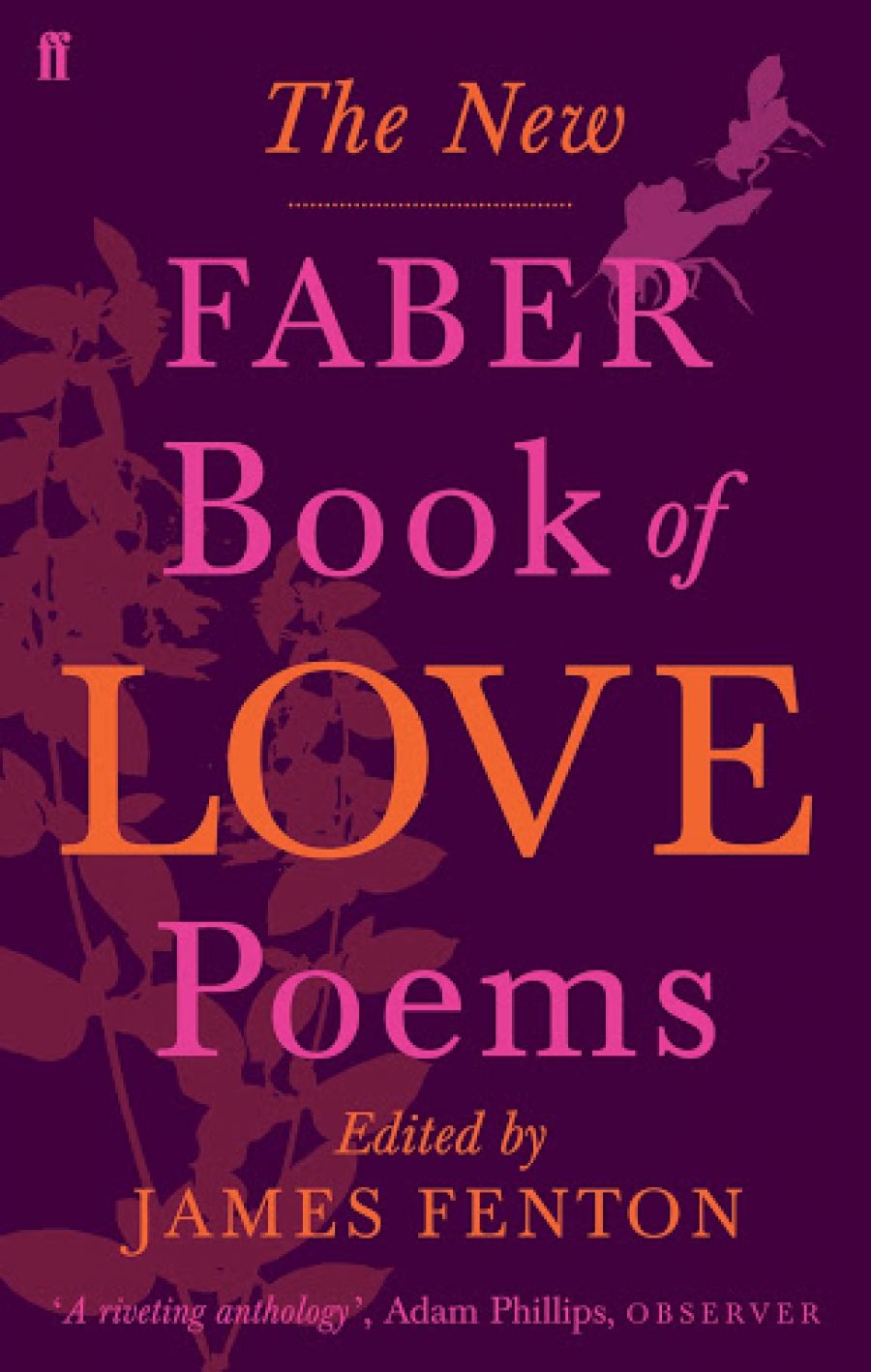
- Free Article: No
- Contents Category: Poetry
- Review Article: Yes
- Online Only: No
- Custom Highlight Text:
The dust jacket describes James Fenton as ‘rightly praised for his own love poetry’. Evidently, Fenton does not demur, because he has found room for six of his own poems when other likely names are represented less generously or not at all. But more of that anon. The introduction begins by quoting Michael Longley: ‘I have believed for a long time … that love poetry is at the core of the enterprise: if poetry is a wheel, then the hub of the wheel is love poetry. Poems which articulate all the other cares and attachments … radiate from the hub like spokes on a wheel.’ Fenton continues: ‘I love you. You love me. I used to love you. You don’t love me. I want to sleep with you. Here we are in bed together. I hate you. You betrayed me. I’ve betrayed you. I want to kill you. Oh no! I have killed you. Such are the simple propositions on which these lyrics elaborate.’
- Book 1 Title: The New Faber Book of Love Poems
- Book 1 Biblio: Faber, $49.95 hb, 463 pp
- Book 1 Readings Link: booktopia.kh4ffx.net/vebNy
Or take Wilfred Owen’s ‘I am the Ghost of Shadwell Stair’. Fenton discusses this at some length in the introduction. It is, he says, one of several works in which Owen is ‘trying to communicate personal experience of the homosexual underworld’. The ghost is Owen ‘looking for … someone with whom to spend the night’. Trawling the demi-monde for a random shag, straight or gay, may make a good poem, but is it a love poem? D.H. Lawrence’s ‘Piano’ is more about remembrance and the past than about the unnamed woman singing. There is a poem by Wallace Stevens. A love poem by him? It seems a contradiction in terms. As Peter Porter once said of Stevens, he had possibly the greatest natural gift since Shakespeare but unfortunately had ichor, not blood, flowing in his veins. And speaking of Shakespeare, even sonnet 129 explicitly states its subject to be lust. Lust need not have anything to do with love. I could go on: Philip Larkin’s ‘An Arundel Tomb’ may be, among other things, a reflection on representations of love, but that doesn’t make it a love poem. Is it Fenton or is it me? I thought I knew what a love poem was.
But perhaps Fenton explains and justifies his selection criteria in the introduction? Well, no. He says that the period covered is that of the modern English language, so nothing before Thomas Wyatt. And that is about all the explanation we get. Why six poems by Snodgrass but nothing by e.e. cummings, James Merrill, Louise Glück, Sharon Olds, to pluck a few names out of the air? Why four poems by Longley but nothing by Louis MacNeice? What, not even ‘Meeting Point’ (‘Time was away and somewhere else’)? Not even that. But he had to find room for six of his own poems. And what about the plentiful lack of poets from outside the British Isles and the United States? What does he say about that? The subject passes without the Shadwell’s ghost of an allusion. It is a little dispiriting to find that as late as 2007 such an anthology can be compiled as though much of the English-speaking world did not exist. Dispiriting, but not surprising. But W.J. Turner finds a place, and Fleur Adcock and, rather astonishingly, Katherine Mansfield – all of them, of course, resident (once or still) in England.
There is, of course, much in this anthology that you would hope to find: ‘Shall I compare thee to a summer’s day’, ‘Dover Beach’, ‘How Do I Love Thee?’, ‘A Red, Red Rose’, ‘So we’ll go no more a roving’, ‘To His Coy Mistress’, ‘The Farmer’s Bride’, ‘Methought I saw my late espoused saint’, ‘Go, lovely rose!’, ‘Strange fits of passion have I known’, ‘Lay your sleeping head, my love’. There are pleasant contemporary surprises too: an erotic poem by Carol Ann Duffy, for example, and a beautiful lyric by Kathleen Jamie (would there had been more). In view of what is missing, far too much space is given to the lyrics of popular songs.
An interesting feature is that poets are arranged alphabetically rather than chronologically (or thematically, as in Geoffrey Grigson’s earlier Faber anthology [1973]). I was keen to find fault with this arrangement, but it does throw up some fascinating juxtapositions, such as Kingsley Amis immediately followed by Anonymous with, ‘Western wind, when wilt thou blow?’ Overall, however, I found this a baffling, perverse and unsatisfactory compilation, both in its choices and in the space allocated to them. Did I mention that Fenton had included six of his own poems?


Comments powered by CComment